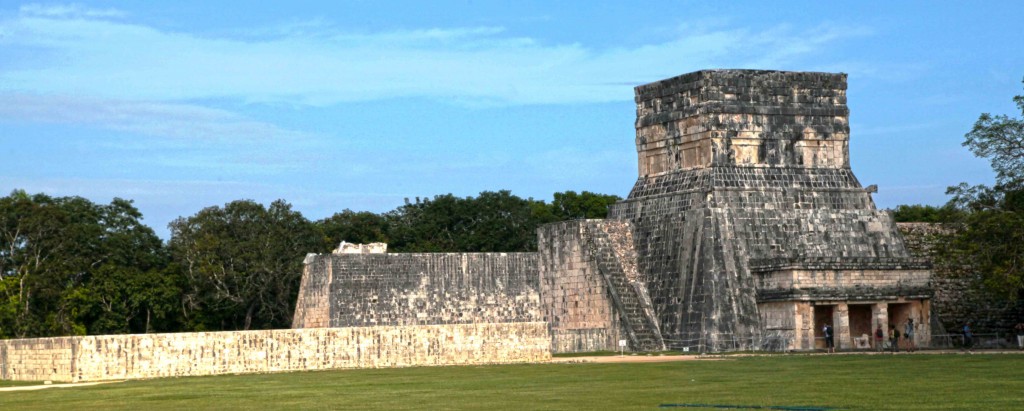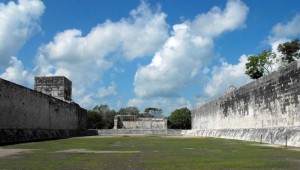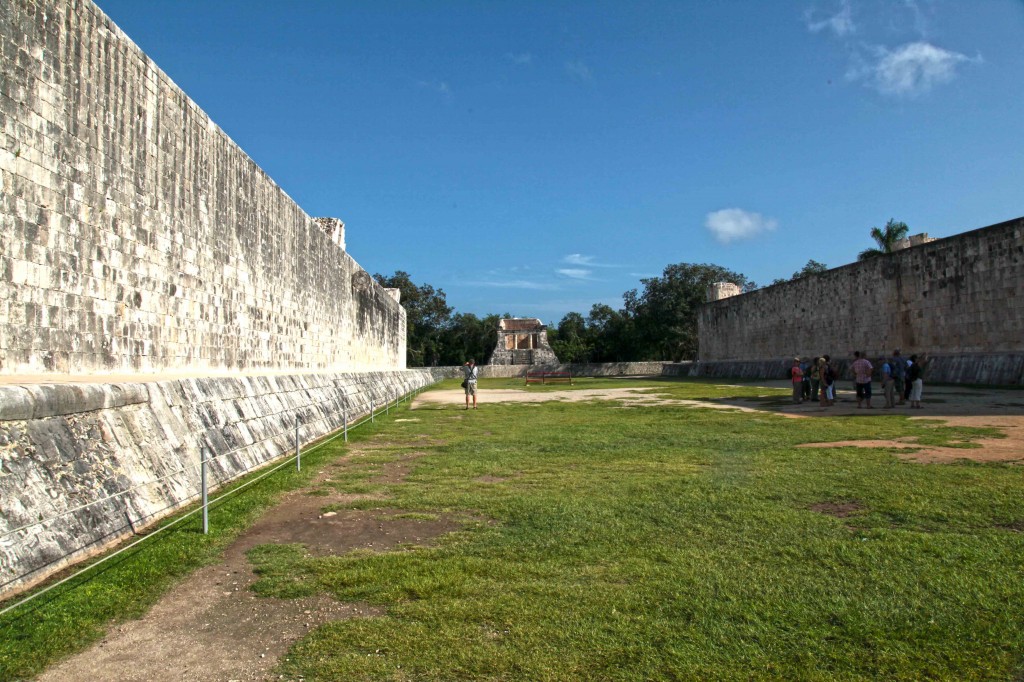Chichen Itza The Grand Ball Court

Ball Courts
There are over 1,300 ball courts in Mesoamerica. They are a large rectangular playfield with two parallel sloping walls on the longest side. In later years, ball courts were completed with end zone wall which forms an “I.” The ball courts were built for many purposes including as an indication of city and individual wealth. Though primarily used as a location for the ball games, archeological evidence also indicates that they were likely used in other spectator sports such as wrestling as well as feasts.
The game was an important part of the social fabric in the Mayan world. Part judge and jury, part religious center, the ball courts were strategically placed in the ceremonial centers of ancient Mayan cities.
There were many different ball games played but they were generally played with solid rubber balls. Just as the size and shape of the court differed from town to town, city to city, the size of balls varied from about the size of a softball to a much larger soccer ball.
The most popular game was called Pitz and because of the large stone rings at Chichén Itza was likely the game of choice for Chichén residents. The object of the game was to propel the rubber ball through the hoop without the use of hands. The balls would bounce down the slanted sides of the court and bounce to the field of play below.
The players would wear different but numerous protective pads on their hips, arms and legs. A wooden or leather yoke often protected their shoulders and torso. Solid rubber balls are extremely heavy and can weigh up to 9 kilos (20lbs). The players costume was topped off with animal headdresses believed to be associated with the player.

The games were serious affairs and were used to settle political and social disputes. A disagreement between two parties or towns could be settled by the recruitment of teams that would play for the parties. Losing a game would often mean decapitation. In many archeological sites, a skull rack is used to display the heads of the victims.
THE GRAND BALL COURT
The Chichén Itza Ball Court is by far the largest field in Mesoamerica. Measuring 168 by 79 meters (551 by 230 ft) the playing field is 2.2 times the size of an American Football field. The parallel walls are each 95 meters (312 ft) long and 8 meters (26 ft) high. The inverted hoops placed in the center of the walls are carved with into decorative feathers. There are incredible panels of ball players along the interior walls.
The court is acoustically perfect. If you talk to the northern wall for example, you can hear it clearly at the southern wall.
There has been some current dispute as to whether this particular ball court was ever used for the game or if it was a gigantic monument to the game and sacrificial victims.
TEMPLE OF THE BEARDED MAN
At the Northern end of the Grand Ball Court is a small temple; three tiers flanked with two large columns. Inside the temple are murals reliefs of men with beards – a very unusual depiction, and hence the name.
The temple opens up towards the ball court and was likely a vantage point for nobility to watch the game or the rituals below. The perfect acoustics are most evident from this vantage point.

TEMPLE OF THE JAGUAR
Located on the eastern side of the great Ball Court, the Temple of the Jaguars is a two story structure with two faces.
The lower level of the Temple face the great Plaza and the Platform of the Skulls. Inside the temple is a jaguar throne and hence the temple name.
The upper level faces the ball court and was a likely vantage point for the nobles and elite of the city. A steep southern staircase leads to the upper temple which features a mural of the 9th century war with what is presumed to be the ancient city of Piedras Negras in Guatemala.